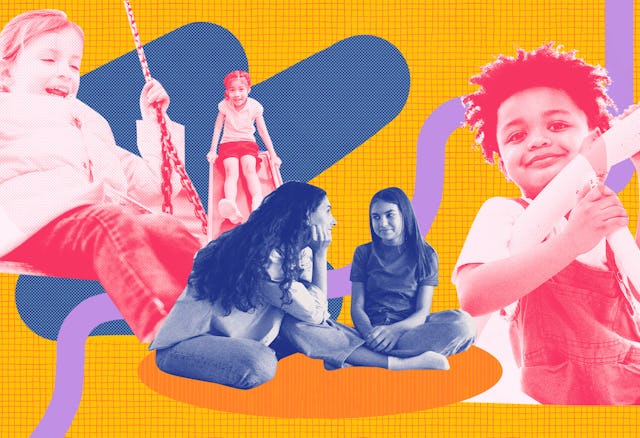Teaching Empathy: How To Raise Kids Who Stand Up For Others & Advocate For Change
Let your children see you show up.

I’ve always been “a feeler.” Empathy comes easy to me, and I’m passionate about calling out injustice. As such, and even more so because I’m a Black mother rewriting expectations on motherhood and parenting, instilling empathy in my kids is a nonnegotiable. But, like many caregivers, I’ve learned that living empathetically and teaching empathy aren’t necessarily the same thing.
It’s both empowering and terrifying to know the influence we hold as parents. We want our children to find connection through differences. We want to facilitate an environment that encourages empathy and allows our children to discover themselves and others. The hope is that as their empathy stretches, so too does their courage to advocate for change.
But it can be hard to know where to start. Here are some things you can do to begin your journey toward raising empathetic, empowered kids.
Let Your Children See You Be Vulnerable
Raquel Martin, PH.D. is an experienced licensed clinical psychologist and researcher studying how mental health impacts success and overall wellness in Black communities. She says building empathy is essential to raising changemakers, and that teaching empathy starts with being open and allowing our children to see us expressing a full range of emotions.
“Sometimes we feel we should shield our children when we have difficulties,” Martin says. “But how will they know that sadness or anger is normal if they don’t see it experienced or properly addressed within their most salient relationship?”
Witnessing a caregiver’s feelings brings early opportunities to practice connection and empathy. My children grow when they witness me managing my emotions in healthy ways, especially when those emotions stem from social injustices. Beyond just teaching empathy, being open and vulnerable with our children can also foster self-awareness and emotional intelligence.
Disclaimer: Be sure to make it clear it’s not their responsibility to fix your emotions.
Show Your Kids That Discomfort Can Be A Gift
“Empathy is based on perspective, and you cannot build that skill by only praising or acknowledging the positive,” says Martin. When we view heavy feelings as a chance to learn about ourselves and others, we can reframe discomfort as a path to empowerment. It also teaches our kids that being uncomfortable doesn’t mean someone else is wrong.
Conflicts with siblings and friends offer endless opportunities to see how people who care about each other can have different perspectives and work through uncomfortable feelings. In our house, we discuss the facts. What is the perceived injustice? How did that make each person feel? And lastly, how can we take responsibility for our part in this experience and do things differently next time?
This tactic isn’t always convenient or fun, but processing difficult emotions has immeasurable value. Injustices like racism, homophobia, and ableism continue to fester in society because it’s too easy for people to prioritize comfort and convenience over humanity. Those are big problems, but starting small at home and teaching our kids to see emotional discomfort as a tool to help them learn and grow can prepare them for the bigger challenges they’ll face later and motivate them to advocate for change.
Teach Your Kids That Feelings & Critical Thinking Aren’t Mutually Exclusive
Too often, those who want to preserve the status quo weaponize feelings as illogical. While it may be true that feelings aren’t facts, the facts of our lives filter through what we feel.
When you talk to your kids about social injustice, it’s OK to let them start with their emotions. Allow them to process in the moment. Give them permission to feel outrage or sadness or fear, and then support them in channeling those emotions into thinking critically about what is and what can be. Show your children that the work you do, from the internal work of researching cultural histories, active listening, and self-reflection, to the external work of community involvement, calling our legislators, or protesting — all started with emotion. More specifically, it started with empathy.
Let Them See You Show Up In Big & Small Ways
A little empathy and emotional intelligence can go a long way. I’ve witnessed my children make connections between the low-stakes scenarios we practice at home and their expanding relationships at school — they know what injustice looks like. When you practice these smaller moments, you establish the building blocks for your children to understand the micro and macro of what impacts us globally. You prepare them for their own activism.
My children have witnessed me speaking on panels and attending rallies since birth, but my most immense joy, and the thing that impacts them the most, is my simply showing up for them. In a culture where white supremacy has crafted countless barriers to emotional intelligence and self-love within Black and other marginalized communities, it’s these small moments of showing up that make the biggest difference. The empathy-building moments you share with your children, from the books you read to the conversations to have, have a significant long-term impact.
Of course, we will make mistakes. But raising empathic changemakers isn’t about perfection — it’s about being in a relationship with your children that allows you to be vulnerable enough to grow together.